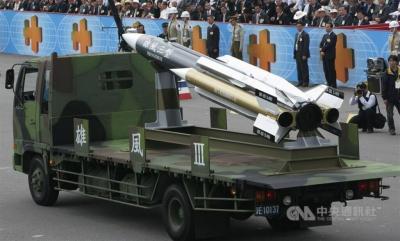An arrest warrant for former National Security Bureau (NSB) officer Liu Kuan-chun (劉冠軍) was issued on April 23, more than two decades after he left Taiwan in the wake of media reports accusing him of embezzling government funds, the bureau said on Thursday.
The warrant issued by the Taiwan High Prosecutors’ Office says that Liu, a former colonel who was director of the Cashiers’ Section, is accused of surrendering to the Chinese government and engaging in espionage operations.
The maximum penalty for both charges is death.
Liu traveled to China in September 2000 after media reports said that he allegedly embezzled about NT$190 million (US$6.81 million at the current exchange rate) of bureau funds allocated to secret government projects.
An arrest warrant was issued that month on money laundering and corruption charges.
However, a re-examination of the case determined that Liu might have leaked information from the projects, for which he was responsible, an unnamed prosecutors’ office official said.
Classified documents were disclosed by the media in 2002, two years after Liu left Taiwan, some bearing a watermark that showed they were printed in Liu’s office at the NSB, the official said.
Liu took the highly classified documents with him when he fled to China, investigators said.
He is believed to have given the documents to Chinese authorities and even helped them decipher messages, investigators said.
In February, the bureau transferred the case to the high prosecutors’ office, which on April 23 issued a warrant for Liu’s arrest on espionage charges.
The Shilin District Prosecutors’ Office, which is in charge of Liu’s embezzlement case, in March applied for a court order to confiscate his assets in Taiwan, which total about NT$200 million.
However, the whereabouts of Liu, now in his 60s, remains unknown.
His wife, Meng Wen-hua (孟雯華), reportedly left Taiwan with their children the day after Liu departed.

STATS: Taiwan’s average life expectancy of 80.77 years was lower than that of Japan, Singapore and South Korea, but higher than in China, Malaysia and Indonesia Taiwan’s average life expectancy last year increased to 80.77 years, but was still not back to its pre-COVID-19 pandemic peak of 81.32 years in 2020, the Ministry of the Interior said yesterday. The average life expectancy last year increased the 0.54 years from 2023, the ministry said in a statement. For men and women, the average life expectancy last year was 77.42 years and 84.30 years respectively, up 0.48 years and 0.56 years from the previous year. Taiwan’s average life expectancy peaked at 81.32 years in 2020, as the nation was relatively unaffected by the pandemic that year. The metric

Taiwan High Speed Rail Corp. (THSRC) plans to ease strained capacity during peak hours by introducing new fare rules restricting passengers traveling without reserved seats in 2026, company Chairman Shih Che (史哲) said Wednesday. THSRC needs to tackle its capacity issue because there have been several occasions where passengers holding tickets with reserved seats did not make it onto their train in stations packed with individuals traveling without a reserved seat, Shih told reporters in a joint interview in Taipei. Non-reserved seats allow travelers maximum flexibility, but it has led to issues relating to quality of service and safety concerns, especially during

A magnitude 5.1 earthquake struck Chiayi County at 4:37pm today, the Central Weather Administration (CWA) said. The hypocenter was 36.3km southeast of Chiayi County Hall at a depth of 10.4km, CWA data showed. There were no immediate reports of damage resulting from the quake. The intensity of the quake, which gauges the actual effect of a seismic event, measured 4 in Chiayi County, Tainan and Kaohsiung on Taiwan's seven-tier intensity scale, the data showed. The quake had an intensity of 3 in Chiayi City and Yunlin County, while it was measured as 2 in Pingtung, Taitung, Hualien, Changhua, Nantou and Penghu counties, the data

The Supreme Court today rejected an appeal filed by former Air Force officer Shih Chun-cheng (史濬程), convicted of Chinese Communist Party (CCP) espionage, finalizing his sentence at two years and two months for contravening the National Security Act (國家安全法). His other ruling, a ten-month sentence for an additional contravention, was meanwhile overturned and sent to the Taichung branch of the High Court for retrial, the Supreme Court said today. Prosecutors have been notified as Shih is considered a flight risk. Shih was recruited by Chinese Communist Party (CCP) intelligence officials after his retirement in 2008 and appointed as a supervisor